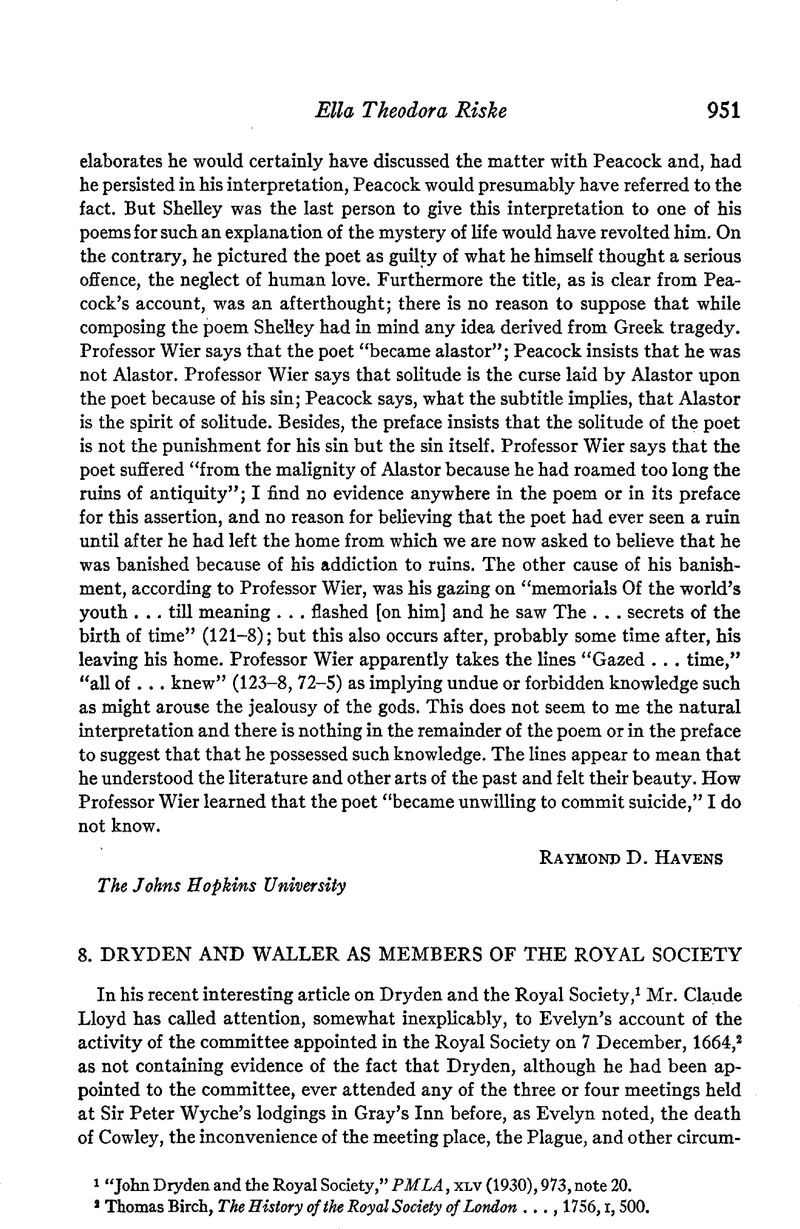No CrossRef data available.
Article contents
8. Dryden and Waller as Members of the Royal Society
Published online by Cambridge University Press: 02 December 2020
Abstract

- Type
- Comment and Criticism
- Information
- Copyright
- Copyright © Modern Language Association of America, 1931
References
1 “John Dryden and the Royal Society,” PMLA, xlv (1930), 973, note 20.
2 Thomas Birch, The History of the Royal Society of London …, 1756, i, 500.
3 John Evelyn, Diary and Correspondence, Bray ed. iii, 456. The passage is quoted by Professor Richard F. Jones in his article “Science and English Prose Style in the Third Quarter of the Seventeenth Century,” which immediately follows Mr. Lloyd's article in the same issue of the Publications as evidence upon excellent authority that Cowley, although not a member of the Royal Society at the time, met with those members who had been appointed within the group to attempt a solution of some of the problems of language and style in which the scientific group was most keenly interested. PMLA, xlv (1930), 199.
4 “Edmund Waller as a Member of the Royal Society,” PMLA, xliii (1928), 162–165.
5 Ibid., 163.
6 Guard Book, O.B. 101, Archives of the Royal Society. Robert Boyle, Works, Printed for A. Millar, opposite Catherine-Street, in the Strand, MDCCXLIV, v, 425.
7 Birch, i, 23.
8 Mr. Lloyd has noted the recognition of his stronger “scientific” interest in the appointment of Waller to the specialized “georgical” committee, while Dryden was assigned to the committee which was to take care of the very general work of “collecting all the phenomena of nature hitherto observed, and all experiments made and recorded.” PMLA, xlv (1930), 973.
9 Birch, ii, 65. Mr. Lloyd does not comment upon this fact in the study of Waller's relations with the Royal Society.
10 Birch, ii, 213.
11 Abraham Hill, appointed to see Waller about his arrearages early in 1682, reported to the Society: “Mr. Waller said, that the plague happening some time after the Society was established, and he being perpetually in parliament had never been able to attend the Society, either to serve them, or receive any advantage thereby.” The statement would seem to represent his relation to the group justly, to be more than a mere excuse offered for defection in payment of dues. Birch, iv, 130.
12 After the report of Hill, “it was ordered, that Mr. Houghton should again attend Mr. Waller, and see to get what he can of his arrears, and make as good a composition with him as possible.” Birch, iv, 133.
13 PMLA, xxiii (1928), 165.
1 John Dryden and the Royal Society, PMLA, xlv (1930), 967–976.
2 Birch, History of the Royal Society, London, 1756, ii, 496.
3 See quotation from Mandeville in Jean Escard, Les Pierres Précieuses, Paris, 1915, p. 15. Escard gives a brief history of the theories about the origin of gems from antiquity down to the present.
4 Pseudodoxia Epidemica, Book ii, Chap. i. Works, ed. Charles Sayle, Edinburgh, 1927, i, 203.
5 Boyle, Works, ed. Birch, London, 1745, i, 277.
6 Ibid. i, 357. The passage referred to by Boyle appears in The Voyage of Van Linschoten to the East Indies, The Hakluyt Society, London, 1885. ii, 138.
7 Ibid. iii, 217–246. See for other statements of this theory iv, 219 and v, 95
8 Birch, History of the Royal Society. i, 247.
1 Sprat, Thomas, The History of The Royal Society of London, London, 1667, 432.
2 Bredvold, L. I., “Dryden, Hobbes, and the Royal Society,” MP, XXV, 435. Professor Bredvold points out several instances in the Essay in which Dryden shows his approval of the new scientific method.
3 Dryden, John, Works (Scott-Saintsbury), Edinburgh, 1884, xi, 12.
4 Ibid. xi, 13.
5 Supra, Bredvold, 435.
6 Dryden, xi, 14.
7 Ibid. xi, 15.
8 Villiers, George, The Rehearsal, Act v, Sc. i, 1. 30 ff. The explanation of what an eclipse really is does not occur in Stapyleton's Slighted Maid, the comedy parodied in this masque.
9 Dryden, xiii, 28, 29. See also Preface to Troilus and Cressida, Works, vi, 266.
10 Ibid. xi, 216.
11 Saintsbury, G., Dryden, (EMLS) 178.
12 Dryden, ix, 104.
13 Browne, Sir Thomas, Works, (edited by Simon Wilkin, London, 1906) i, 94 f.
1 See Diary and Correspondence of John Evelyn, Wheatley ed., iii, 309.
2 See Birch, History of the Royal Society of London …, i, 499–500.
3 See Sprat, An Account of the Life and Writings of Mr. Abraham Cowley, prefixed to his edition of Cowley's works, London, 1700, ix.


